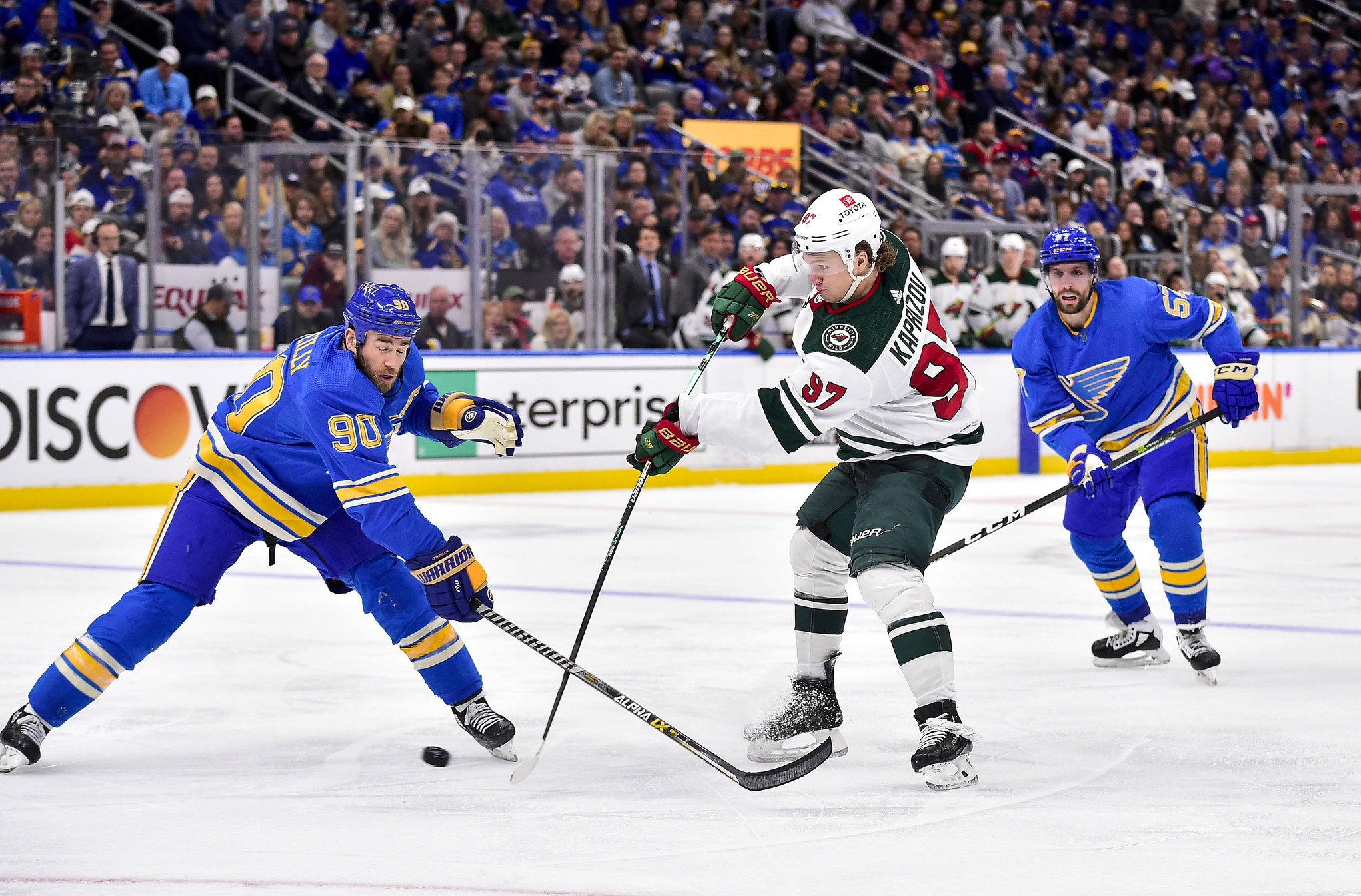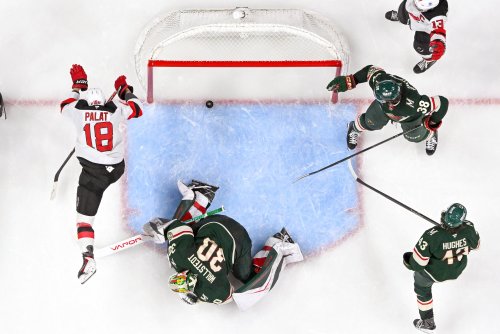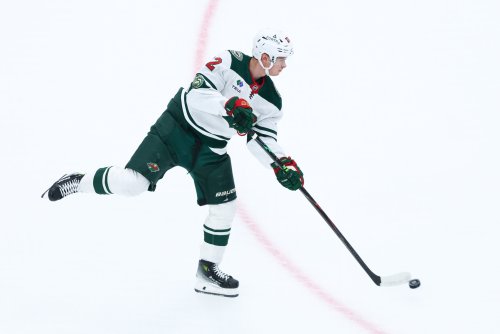
It's understandable if the Minnesota Wild have some beef with the NHL's playoff format. In Year 2 of the Zach Parise/Ryan Suter Era, the league adopted a Divisional Playoff format, which stood ever since. The format is good at some things, mostly, skewing the early rounds of the Stanley Cup Playoffs towards rivalries. But for Minnesota, it had an additional, unpleasant effect.
It funneled the best teams in Wild history into the wood chipper known as the 2010s Central Division. Running into the juggernaut Chicago Blackhawks every year capped their ceiling at the second round. You may say, hey, if Minnesota couldn't beat the Blackhawks, they shouldn't have been a Conference Final team. Sure. But wow, was it disheartening as a fan to know playing Chicago by Round 2 was inevitable.
Heck, even now, the Division Playoff format is a drag. Under a typical 1-8 playoff system, Minnesota would be fighting with the Calgary Flames and St. Louis Blues for second place in the Western Conference, and the right to play a weaker seventh-seed. Their worst possible finish would be fourth-place, setting up a match-up against (currently) the fifth-seed Edmonton Oilers. Considering Minnesota's 3-0 record against them this year, they'd take that, thank you very much.
Instead, they will play the Blues in the first round, no matter what happens. This will be true, even if the Wild and Blues finish with the second- and third-most points in the West, a real possibility. Over the next month or so, this silly and bad playoff format will no doubt come under scrutiny in the State of Hockey. We're definitely going to hear local calls for change, especially if they lose.
But you know what's not going to help the Wild? Making the playoffs worse. That's what ESPN's Greg Wyshynski is proposing in his article, "Why the NHL must expand the Stanley Cup playoffs." In it, he proposes following the leads of the NFL, MLB, and NBA in expanding their playoff format. This would follow the NBA's model of a play-in tournament between the 7th-10th seeds, followed by a re-seeded 1-8 format.
So if you're sad you won't get to see a playoff match-up between the Columbus Blue Jackets and New York Islanders, good news, I guess.
Look, no one's saying the Wild are in a good position, or that the current playoff format is good. If the Wild and Blues meet as the second and third-best teams in the West, that's awful and bad. That'd be like the Buffalo Bills and Kansas City Chiefs squaring off in the Divisional Round in the NFL. Or Duke and Texas Tech squaring off on Day 1 of March Madness. It's, well, madness!
Should they dispatch the Blues, Minnesota's reward would be to run into the first-seed, potential President's Trophy-winning Colorado Avalanche. Maybe this new-look Wild is ready to take on this gauntlet. Who knows? But the point is, they shouldn't have to. Furthermore, this Divisional Format sets up bizarre late-playoff matchups that don't showcase the league at its best.
That probably needs to change, but introducing teams that simply don't belong in the playoffs just makes that problem worse.
Look at last year's Montreal Canadiens. They were a 24-21-11 team (eight more losses than wins!!) that made the playoffs by virtue of being a fourth-seed in a terrible re-aligned all-Canadian division. Once they beat the Toronto Maple Leafs in the first round, the only thing standing in their way to a Conference Final appearance were the Winnipeg Jets, who finished third in the North Division.
That's a second-round matchup between the 14th-best team in the NHL and the 18th-best, with the 18th-best team moving on. Meanwhile, the teams slugging it out in the Wild's division were Colorado and the Vegas Golden Knights, who tied for the most points in the NHL. Who wanted to see one of the top-two teams in the league bounce in Round 2, while a bad Canadians team moved on to the Conference Final? Outside of Montreal, it should've been no one.
You have to give Montreal some credit for taking Vegas down to advance to the Stanley Cup Final, but Vegas had a much harder path to follow. They took on the ninth-best, then best team to reach Round 3. Montreal's path was the fifth-best, then the 14th-best. It was competitively un-balanced and created a boring Cup Final, where Tampa Bay buzzsawed a team that didn't belong on the ice with them.
In the one season where they did roll out an expanded playoff format (the bubble hockey year), they also had that issue. With 24 teams in the playoffs, the NHL lost a lot of its star power before the field was even shortened to 16 teams. The 24th and 23rd-best teams in the league eliminated Top-10 teams with Hart Trophy-winning duos of Sidney Crosby and Evgeni Malkin, then Connor McDavid and Leon Draisaitl. The 20th-ranked Vancouver Canucks knocked out St. Louis in the first round, the defending Cup champions and the top team in the West.
Again, you can say, win your playoff games against these lowly teams. But there's a problem with adopting a play-in tournament that doesn't exist with the NBA: Anyone can win a seven-game series.
Theoretically, that's true in the NBA. But in practice, there's very little chance the Miami Heat or Phoenix Suns will lose to a play-in team. According to a 2018 study, a seven-game series in the NBA leads to the better team advancing 80% of the time.
The influence of goalies and their seemingly random hot-and-cold streaks evens things out significantly in the NHL. The better team advances just 60% of the time, which isn't much better than a coin flip. To put that in context, that's about the same odds as the Wild beating the Canucks at home last Thursday night. Sure, a Vancouver win would be an upset, but no one would be shocked if they did.
There's some appeal to giving a team like Vegas, who has a great but injury-riddled roster, a mulligan should they miss the playoffs. But that's not worth the chances that a completely awful team like the Winnipeg Jets or Blue Jackets gets hot goalies, wins two or three coin-flip games, and makes a deep run. No one needs to see No. 1 Defenseman Neal Pionk or No. 1 Center Jack Roslovic get stomped after accidentally making the Cup Final.
One can question the harm in letting 20 teams make the postseason, given that half the league already gets in. But if anything, that's a case for contracting the playoffs, not expanding. Adopting a play-in series where Teams 1-4 automatically get in, while teams 5-12 slug it out? Is it gimmicky? Sure. But at least the gimmick is highly likely to produce compelling matchups with elite teams. At worst, it'd join 3-on-3 overtime in the "At least it's fun" category of gimmick.
And wow, look at how tight those races become with a 12-team format that takes the Top-6 teams from each conference! The Tampa Bay Lightning, Boston Bruins, Pittsburgh Pengins, and Washington Capitals are all within three points of each other for the fifth and sixth-seeds (as of Thursday). The sixth-place Nashville Predators hold a one and two-point lead, respectively, above Edmonton Oilers and Dallas Stars. That's more regular-season drama than would exist in a 20-team format, or even now.
Of course, that's off the table because fewer playoff teams mean less revenue. But despite being an easy source of cash, Wyshynski cites Gary Bettman as being the biggest roadblock to the format. That's weird because the NHL should theoretically want the money-printing machine to go brrrrrrrrr.
But whether he realizes this, or is making the right marketing decision by accident, Bettman's doing the right thing by not taking the easy money here. The best way to market the game isn't to build a bigger stage, it's trying to get the best teams on the biggest stage. Letting more bad clubs into the dance does the opposite in a way that it doesn't for the NBA. The Divisional Format hurts this cause somewhat, but with the Cup Final being dominated for the last decade by star-studded teams like Chicago, Tampa Bay, Pittsburgh, Washington, and Boston, they mostly get it right.
Yes, there are some valid points in the article. Yes, teams like St. Louis and Minnesota have nothing to play for that can change their destiny. And yes, his secondary proposal to ditch the Divisional Format is good. The problem is, that all can be fixed by re-implementing a 1-8 format. It's a solution that leads to better match-ups later in the playoffs, and as a bonus, gives the Wild a bit of a breather in Round 1. The State of Hockey could easily have it all! There's no need to add a gimmick that waters the playoffs down and subjects fans to bad hockey.
Think you could write a story like this? Hockey Wilderness wants you to develop your voice, find an audience, and we'll pay you to do it. Just fill out this form.







Recommended Comments
There are no comments to display.
Join the conversation
You can post now and register later. If you have an account, sign in now to post with your account.
Note: Your post will require moderator approval before it will be visible.